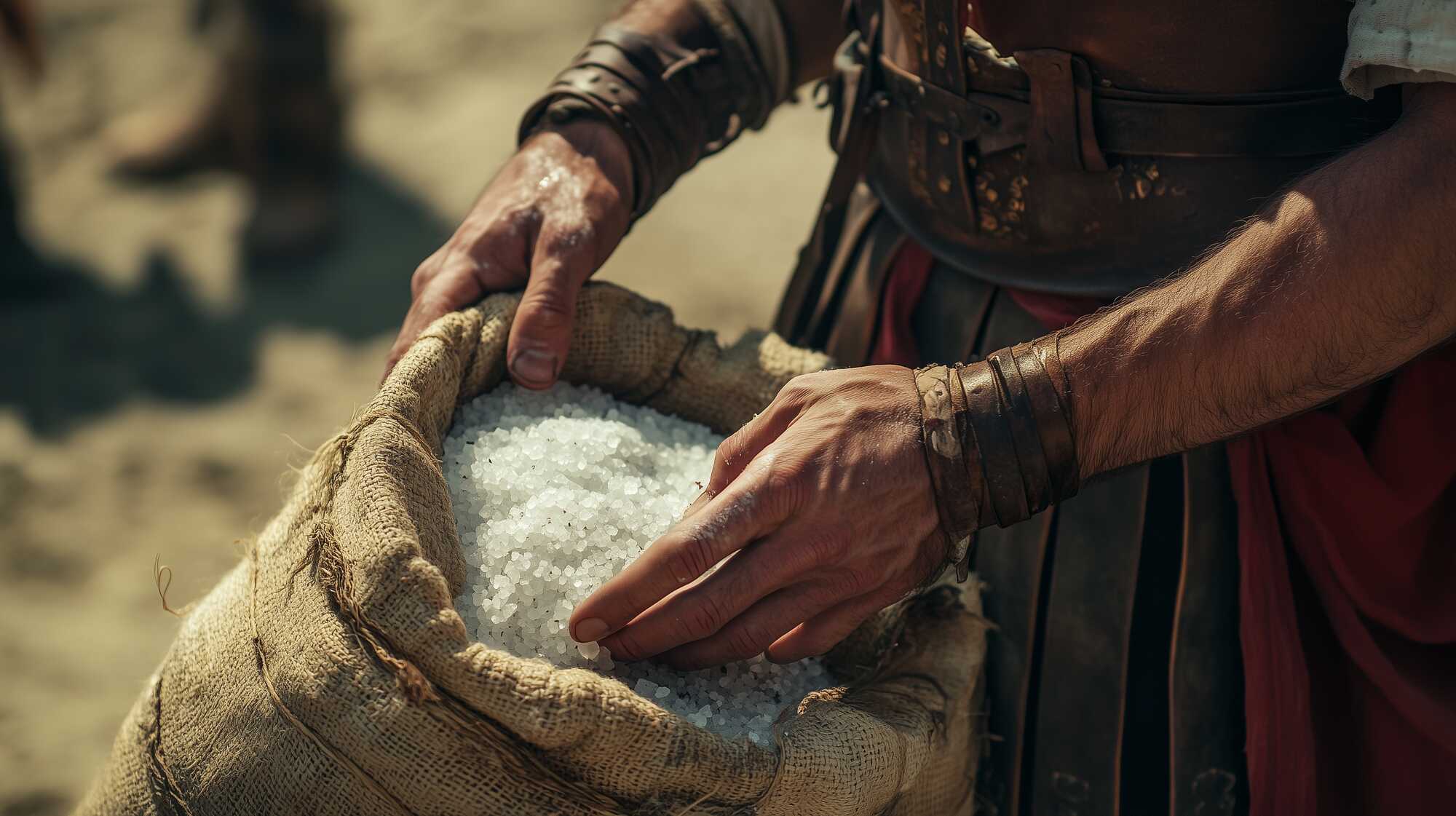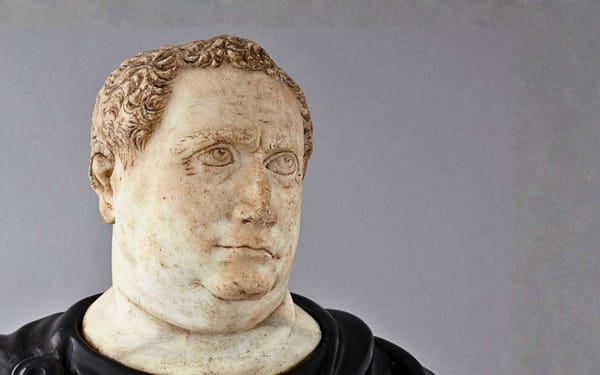Does the Word ‘Salary’ Derive from Salt? What is the Connection with Roman Soldiers?
Salt and salary are often linked to Roman soldiers, but historical records reveal a different understanding of military pay in ancient Rome.

The idea that Roman soldiers were paid in salt is a claim repeated so often that it feels almost unquestionable. Yet, a closer examination of historical sources reveals a more complex—and far more interesting—story. How did salt come to be linked with salary, and what role did it actually play in Roman military life?
What makes things more confusing is that the term salary, derives from the Latin 'salarium', which was a stipend given to Roman soldiers, possibly to purchase salt, but more broadly as a monetary allowance. This distinction reinforces the idea that soldiers were not paid in salt itself.
Salt and Salary: The Origins of a Persistent Roman Myth
Thus, the core of the myth is simple: Roman soldiers were supposedly paid in salt, or given an allowance specifically for purchasing it—‘salt money’. This idea is often accompanied by a cluster of related inaccuracies. Consider this widely circulated, but deeply confused passage:
"I thought you might like to know just where your salary comes from. The word, at least.
The source seems to be the Latin ‘salarium’ (‘sal’ being salt) which is a word tied to the payments made to soldiers in the early Roman salt trade.
In those days, salt (regular ordinary table salt) was a prized and valuable commodity. If you’ve ever heard the phrase ‘you are the salt of the earth’ or ‘worth your salt,’ both are referring to the high value of salt.
A soldier’s pay – consisting in part of salt – came to be known as solarium argentum, from which we derive the word salary.
A soldier’s salary was cut if he ‘was not worth his salt,’ a phrase that came into being because the Greeks and Romans often bought slaves with salt."
Time, “A Brief History of Salt,” March 15, 1982
Let’s begin with what’s actually correct. First, the English word salary does indeed come from the Latin salarium, meaning a money allowance or stipend. Second, salarium is linguistically connected to sal (salt), likely through the adjective salarius, meaning "pertaining to salt."
But that is where historical accuracy ends.
The appeal of the myth lies in the surface-level connection between sal and salarium, prompting people to seek explanations—despite the fact that no surviving ancient source tells us what this link originally meant. In the absence of evidence, the gap is filled by speculation and attractive storytelling.
Those who perpetuate the myth rarely cite primary sources. When they do try, they often refer to two Roman writers. The first is Pliny the Elder, who in his Natural History reflects on salt’s cultural and practical importance:
“We may conclude, then, by Hercules! that the higher enjoyments of life could not exist without the use of salt: indeed, so highly necessary is this substance to mankind, that the pleasures of the mind, even, can be expressed by no better term than the word "salt," such being the name given to all effusions of wit.
All the amenities, in fact, of life, supreme hilarity, and relaxation from toil, can find no word in our language to characterize them better than this.
Even in the very honours, too, that are bestowed upon successful warfare, salt plays its part, and from it, our word "salarium" is derived.
That salt was held in high esteem by the ancients, is evident from the Salarian Way, so named from the fact that, by agreement, the Sabini carried all their salt by that road.
King Ancus Martius gave six hundred modii of salt as a largess to the people, and was the first to establish salt-works.
Varro also informs us, that the ancients used salt by way of a relishing sauce; and we know, from an old proverb, that it was the practice with them to eat salt with their bread.
But it is in our sacred rites more particularly, that its high importance is to be recognized, no offering ever being made unaccompanied by the salted cake.”
Pliny the Elder, Natural History, Book 31, Chapter 41

This misquotation exemplifies how modern interpretations can distort historical texts, underscoring the necessity of consulting original sources to avoid perpetuating inaccuracies. The second reference often used is to Roman state taxation of salt: In 204 BCE, the historian Livy recounts how Roman censors introduced a new source of public revenue:
"They also established a new revenue from the yearly production of salt. Both at Rome and throughout Italy salt was then sold at one-sixth of an as.
The censors let contracts for the sale of salt at the same price at Rome, at a higher price even in market-towns and local centres, and at prices which varied from place to place.
This source of revenue was generally believed to have been devised by only one of the censors, who was angry with the people because he had formerly been condemned by an unjust verdict; and that in the price of salt those tribes by whose efforts he had been condemned were most heavily burdened.
Hence the cognomen Salinator was bestowed upon Livius."
Livy, History of Rome
Elsewhere, Cato the Elder is also said to have referred to officials managing the salt tax, the salinatores aerarii, as a recognized public office during the early 2nd century BCE (cited by Servius in his commentary on Aeneid 4.244). But beyond these economic and religious references, no ancient source claims soldiers were paid directly in salt.

Despite that, a fabricated quotation from Pliny circulates widely on Wikipedia and across the internet:
Illustration: Roman Empire Times, Midjourney
“If I had a denarius for every fake quote…”
"Similarly, the Latin word salarium linked employment, salt, and soldiers, but the exact link is not very clear.
This link goes back to the Roman historian Pliny the Elder, who stated as an aside in his Natural History's discussion of sea water, that '[I]n Rome... the soldier's pay was originally salt and the word salary derives from it...'"
This quotation is not found in Pliny at all. It misattributes content, inaccurately suggests he was writing about seawater (he wasn’t), and introduces invented wording. Yet this fabricated quote has been copied and repeated in countless books, articles, and online posts.
In short, while salarium may linguistically relate to salt, there’s no historical basis for the belief that Roman soldiers were paid in it. The myth continues because of the pleasing neatness of the etymology, and because it feels like it should be true—despite what the actual sources reveal. (“Salt and salary: were Roman soldiers paid in salt?,” by Dr Peter Gainsford)
Salt in the Roman Empire: Uneven Sources and the Challenge of Scale
Pliny the Elder’s Natural History, along with accounts from Aristotle and Strabo, offer valuable entry points into understanding salt in the ancient world. As Adshead (S.A.M. Adshead is a historian renowned for his comprehensive work on the global history of salt, particularly in his 1992 book Salt and Civilization) noted in 1992:
“Thanks to Strabo and Pliny we are reasonably well informed about how salt was produced in the Roman Empire”
Yet despite these sources, one quickly encounters the fragmented and inconsistent nature of the available evidence. Literary references are patchy, while epigraphic and archaeological findings do little to resolve the gaps.
One of the major obstacles is the absence of statistical data, which makes it difficult to grasp salt’s spatial and temporal significance across the empire. To address this, it becomes essential to investigate what the scale of production and demand might have been in specific periods and regions—considering both recorded and yet-to-be-inventoried sites such as salt marshes, rock salt mines, lakes, and springs.
Equally important is recognizing the broad range of salt’s applications. Beyond its culinary role—in cooking, seasoning, preservation, and sauces like garum—salt was also vital for livestock feed and numerous non-food uses: tanning hides, fixing dyes, metallurgy, cosmetics, medical therapies, and pharmacology.
Estimating the quantities involved is not merely academic curiosity. For instance, by the end of Augustus’s reign (14 AD), the Italian peninsula likely represented a market of around 50,000 tonnes of salt. It is doubtful this demand could have been met solely by Ostia’s salt flats.
Given the lack of direct statistical records, it remains worthwhile to explore to what degree we can compensate for this absence—however cautiously—in order to shape a more grounded and constructive understanding of salt's role in Roman economic and social life. (Archaeology and Anthropology of Salt: a Diachronic Approach, edited by Marius Alexianu, Olivier Weller, Roxana-Gabriela Curcă)

Tracing the Salarium: Between Fiction and Administrative Reality
Although the term salarium is often loosely linked to salt in popular etymologies, its appearance in historical documents demands closer scrutiny. A passage in the Historia Augusta claims to record the stipend—salarium—bestowed on Marcus Aurelius Claudius (later Emperor Claudius Gothicus) by Emperor Valerian.
While the Historia Augusta is widely regarded as an unreliable and at times fictionalized source, C. E. Van Sickle has argued that the inclusion of such administrative details may reflect echoes of genuine bureaucratic practices. His 1954 study suggests that even forged or embellished texts might preserve traces of historical reality, particularly when the terminology and structure used—such as in the recording of a salarium—align with known Roman conventions.
In this case, the salarium mentioned does not refer to salt or goods in kind but rather to monetary compensation within the imperial framework. Though its authenticity remains uncertain, the passage invites reflection on how Roman authors framed pay, prestige, and imperial favor. (The ‘Salarium’ of Claudius Gothicus (Claudius XIV, 2-15) Viewed as a Historical Document, by C. E. Van Sickle)
Too Much Salt: The Impracticality of Salt as Pay
Even if we allow for salt’s value in antiquity, the notion that Roman soldiers were compensated in salt quickly collapses under logistical scrutiny. Consider the arithmetic: in the third century CE, a Roman legionary might earn around 1,350 denarii per year. According to Diocletian’s Edict on Maximum Prices (301 CE), salt cost approximately 100 denarii for 17 liters. A literal translation of salary into salt would therefore amount to over 230 liters annually—roughly 4.5 liters per week.
Such quantities would have been wildly impractical for soldiers who were already burdened with weapons, armor, and supplies. Carrying sacks of salt as pay—not to mention storing or exchanging it—would have made little sense, especially in a monetized imperial economy with well-established silver coinage and supply chains.
Salt, while indispensable for preserving food and tanning hides, was simply too bulky and perishable to function as standardized pay. More plausibly, salt was a state-controlled commodity, and any association it had with military logistics would have related to provisioning and taxation—not direct remuneration.

Salt Networks and the Environmental Geography of Early Rome
Gabriele Cifani’s work emphasizes the importance of salt not just as a valued substance in antiquity, but as a geographic and administrative factor shaping early Roman development. His research points to a radial model of salt distribution emerging from natural sources—such as springs and outcrops—which influenced the placement of settlements and infrastructure.
Some towns near salt-rich zones bore names reflecting their connection to salt and likely served as nodes of Roman control over coastal industrial production. These areas had ready access to port facilities, suggesting that salt was organized, transported, and possibly taxed within a broader imperial system, rather than being dispersed informally or used as direct payment.
Cifani underscores the need to interpret the archaeological landscape in terms of administrative control, environmental accessibility, and transport logistics, reinforcing the idea that salt’s real value in Roman times lay in provisioning and power—not payroll. (The salt of early Rome: historical, economic and environmental contexts, by Gabriele Cifani)
The Via Salaria: A Road for Salt, Not a Route to Wages
The Via Salaria—Latin for "Salt Road"—is often invoked to support the claim that Roman soldiers were paid in salt. In reality, it was a trade route used to transport salt from the Adriatic coast to central Italy, particularly to the Sabine region.
Pliny the Elder mentions the Via Salaria in connection with salt’s distribution, noting that the Sabines transported their salt along this route. The Via Salaria reflects the infrastructure of Roman logistics and commerce, but not the means of military compensation.
So, although Roman soldiers weren’t paid in salt, the state treated it as a valuable resource. As aforementioned, Livy records that in 204 BCE Roman censors created the new stream of public revenue from the sale of salt, standardizing prices at Rome and adjusting them across different regions.
This centralized management demonstrates the commodity’s importance in fiscal policy, not payroll. Later, Cato the Elder referred to officials called salinatores aerarii—treasurers managing salt taxation. Salt thus appears in Roman administration, but always in the context of taxation and provisioning, not military wages.

The enduring belief that Roman soldiers were paid in salt has persisted largely because it feels intuitively true—salt was valuable, the word salarium exists, and modern idioms reinforce the connection. But historical evidence simply does not support the notion.
Thus, while salt may have been included among army provisions or played a broader role in Roman logistics and taxation, no ancient source—Pliny included—ever states that salt was a form of military pay. The word salary may indeed derive from salarium, a term possibly once connected to salt in a more symbolic or administrative way, but any concrete financial relationship between salt and soldierly wages remains speculative at best.
As modern readers, we inherit not only the Latin roots of our language but also the myths that have attached themselves to them. Salt sustained the empire—but it did not fund it.





About the Roman Empire Times
See all the latest news for the Roman Empire, ancient Roman historical facts, anecdotes from Roman Times and stories from the Empire at romanempiretimes.com. Contact our newsroom to report an update or send your story, photos and videos. Follow RET on Google News, Flipboard and subscribe here to our daily email.
Follow the Roman Empire Times on social media: